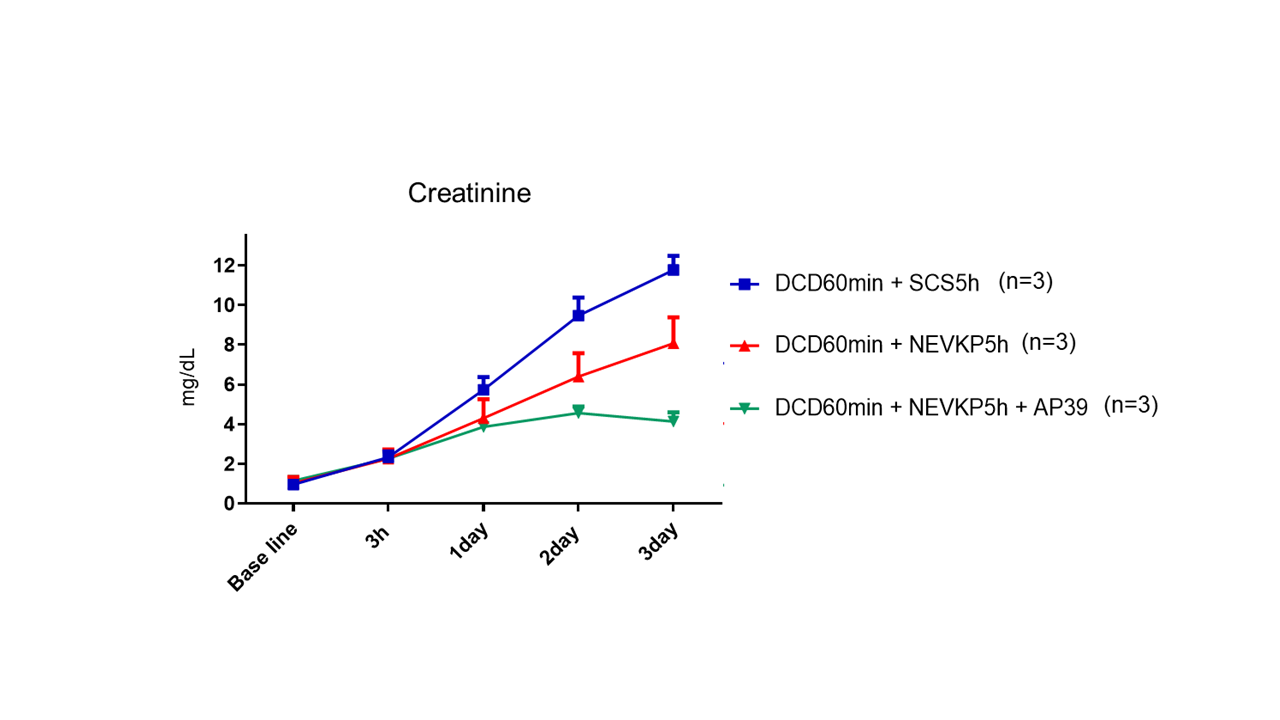AP39 administration during normothermic ex vivo kidney perfusion reduces preservation injury
Masataka Kawamura1,2,3, Catherine Parmentier1,3, Samrat Ray1,3, Sergi Clotet-Freixas1,4, Laura Mazilescu1,2,3, Emmanuel Nogueira1,3, Yuki Noguchi1,3, Toru Goto1,3, Bhranavi Arulratnam1, Sujani Ganesh1, Trevor Reichman1,3, Ana Konvalinka1,4,5,6,7, Lisa Robinson2,6,8, Markus Selzner1,3.
1Ajmera Transplant Centre, Toronto General Hospital, Toronto, ON, Canada; 2Division of Nephrology, The Hospital for Sick Children, Toronto, ON, Canada; 3Division of General Surgery, University Health Network, Toronto, ON, Canada; 4Toronto General Hospital Research Institute, University Health Network, Toronto, ON, Canada; 5Division of Nephrology, Department of Medicine, University Health Network, Toronto, Toronto, ON, Canada; 6Institute of Medical Science, University of Toronto, Toronto, ON, Canada; 7Department of Laboratory Medicine and Pathobiology, University of Toronto, Toronto, ON, Canada; 8Program in Cell Biology, The Hospital for Sick Children Research Institute, Toronto, ON, Canada
Background: Normothermic Ex-vivo kidney machine perfusion (NEVKP) is a novel preservation technique for marginal kidney grafts. We recently determined that NEVKP preserves the expression of key proteins involved in mitochondrial biogenesis in kidneys, which could explain the improvement in graft function. We hypothesize that supplying oxygen during ex vivo machine perfusion will replenish energy levels in mitochondria, thereby restoring mitochondrial function and reducing injury in marginal kidney grafts. AP39, a mitochondria-targeted hydrogen sulfide donor, has been shown to stimulate mitochondrial electron transport and improve cellular bioenergetic function.Here, we investigated whether the supplementation of AP39 during NEVKP protects mitochondrial function and improves renal grafts against ischemia reperfusion injury.
Methods: Porcine kidneys were exposed to 60 min of warm ischemia followed by 5 hrs of static cold storage (SCS) or NEVKP. The swine were divided into three groups: the SCS group, the NEVKP group, and a third group in which AP39 was additionally administered during NEVKP (NEVKP + AP39). After contralateral nephrectomy, grafts were auto-transplanted and animals were followed for 3 days. Renal and mitochondrial function were assessed and compared between groups.
Results: All animals survived the follow-up period in all 3 groups. Grafts preserved with NEVKP had lower serum creatinine (SrCr) on postoperative day 3 compared to the SCS group. Treatment with NEVKP + AP39 further reduced SrCr when compared to the NEVKP group (SrCr SCS vs NEVKP vs NEVKP + AP39: 11.7±0.7 mg/dl vs 8.1±1.3 mg/dl vs 4.1±0.8 mg/dl, mean±SD). This was also true for BUN on postoperative day 3 (BUN SCS vs NEVKP vs NEVKP + AP39: 125±21.7 mg/dl vs 64.7±23.5 mg/dl vs 27.3±2.9 mg/dl). We have performed ATP assay analysis on biopsy-derived cell suspensions from SCS and NEVKP stored grafts. Both ATP levels were increased in the NEVKP group compared with SCS group at the time of pre-implantation (ATP SCS vs NEVKP: 25.6±10.6 nM/10000cells vs 114.8±10.3 nM/10000cells).
Conclusion: For grafts after prolonged warm ischemic time, NEVKP has shown to have the potential to improve mitochondrial function. Future studies will determine whether administration of AP39 during machine perfusion facilitates organ preservation by further preserving mitochondrial function.


right-click to download
